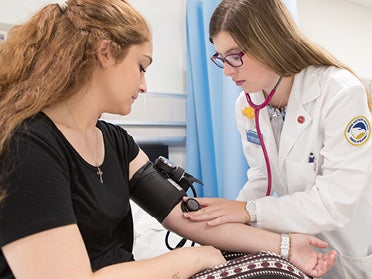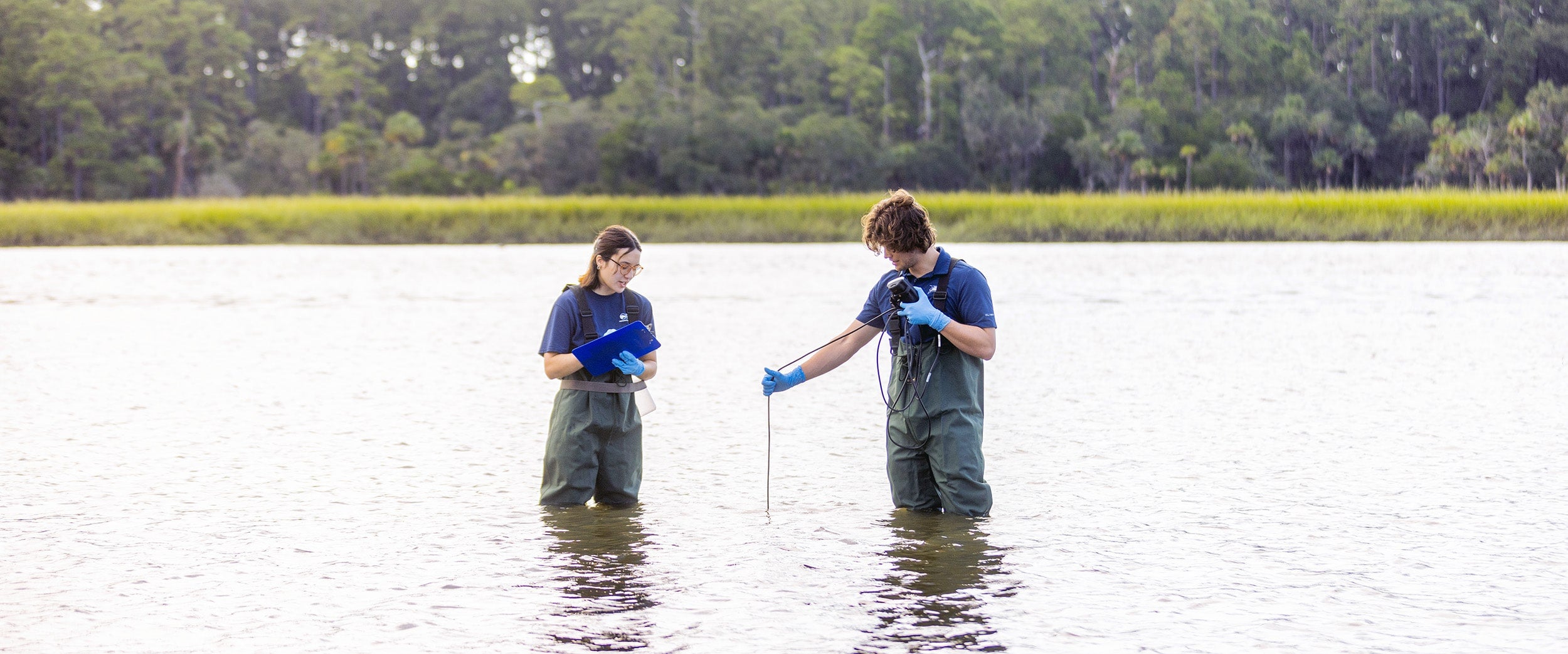Learn to elevate the health and well-being of whole communities through education, policy, research and skilled interventions as a public health professional.
Locations
- Statesboro Campus (In Person)
- Online
Why Earn an MPH at Georgia Southern?
- Build your expertise to advance your career in public health.
- Limited assistantships are available to help fund your studies.
- Two concentrations offered are completely online.
- Student-centered, project-based learning.
- 42 credit hours to completion.
As a highly trained public health professional, you will have the opportunity to empower whole communities, addressing challenges ranging from food safety to equitable health care access. Get the preparation you need to advance in your field and grow your influence in Georgia Southern University’s Master of Public Health (MPH) program.
Study the discipline’s fundamentals and develop expertise in a career-focused area by selecting from our seven concentrations. As experienced practitioners and active scholars, your instructors propel your learning through project-based courses that focus on real-world examples. Outside of the classroom, you’ll sharpen your judgment and gain on-the-ground experience through an immersive, field practicum aligned with your interests.
Whether you desire full-time study to launch your career in public health or are a working professional looking to enhance your existing skills, you can find an option that matches your needs with online and on-campus, full- and part-time formats available.
Ready to Apply?
What Can You Do With a Master’s in Public Health?
Transform your community on the ground through new programs or research shaping new medical treatments. No matter your concentration, earning an MPH positions you for various roles projected to see rapid growth, including in public health policy and management, epidemiology, and social and community services.
Where our graduates work:
- American Red Cross
- CDC
- FDA
- Health departments and districts across the country
- Hospitals
- Pharmaceutical Companies
- USDA Forest Service
What our graduates do:
- Biostatistician
- Community program manager
- Epidemiologist
- Healthcare data analyst
- Health services administrator
- Medical writer
- Policy advisor
- Policy Analyst
- Prevention Specialist
- Public health consultant
- Regulatory Specialist
- Research Associate
What You’ll Learn
Georgia Southern’s MPH program prepares you in the core areas of public health, including biostatistics, community health, environmental health sciences, epidemiology, and health policy and management. Through this lens, you elevate your understanding of community empowerment and mobilization, networks and partnerships to address public health challenges.
Your concentration expands your expertise in select disciplines and lets you align your studies with your career path.
In a practicum assignment, you participate in outreach, policy development or research for a community, public health, government or similar agency. During the capstone experience, you integrate your hard and soft skills to propose a solution to an ongoing policy or population health challenge.
See the CurriculumConcentrations
Combine core competencies in the five basic areas of public health with specialized expertise in one of seven domains to customize your curriculum to your career goals.
Applied Public Health (Fully Online)
Become a frontline practitioner and leader, focusing your studies on public health education, information and advocacy. Electives allow you to tailor your learning further to fit your unique path.
Biostatistics
Learn to apply statistical reasoning and methods in addressing, analyzing and solving problems in public health and health care while developing the skill set for biomedical, clinical and population-based research.
Community Health
Prepare to advance public health knowledge and reduce the burden of disease in individuals, families and communities through the application of social and behavioral science theory. Address public health problems, including health disparities in rural and urban environments.
Environmental Health Sciences
Recognize the public health implications of environmental and occupational factors responsible for influencing mortality and morbidity in human populations, preparing to serve as an environmental health practitioner in a variety of public health settings.
Epidemiology
Acquire a comprehensive understanding of diseases affecting the human body in order to explain population occurrence, distribution and causative factors. You’ll train to function effectively as an epidemiologist in a variety of public health settings.
Public Health Informatics (Fully Online)
Master skills essential for informing contemporary public health practice and policy. Courses cover health informatics foundations and terminology, the use of information systems to improve health outcomes, health data analytics, information systems management and data visualization for evidence-based practice.
Health Policy and Management
Build leadership skills for developing policy and managing public health organizations and programs. Prepare for roles as a public health or health care advisor, administrator or policy analyst.
Build Your Experience
Start to empower and better connect with the populations you serve while applying the principles and techniques you’re studying to real-world scenarios.

Public Health Practicum
Apply your knowledge in a public health facility, government agency or related setting during a 300-hour supervised field placement. You’ll select the site to align with your chosen program concentration.

Study Abroad
Complete your practicum in Ghana or take coursework and engage in local public health work in Ireland to enrich your studies with a global perspective.
“Georgia Southern really provided hands-on learning experiences that have helped shape my future and endowed me with a broad range of transferable skills.”
Want to Learn More?
Explore essential information about our Master’s in Public Health program, including application details, accreditation status, and licensing disclosures. Gain insight into the program’s credibility and requirements to help you start your journey toward success with the knowledge you need.
Admission into the graduate programs within the Jiann-Ping Hsu College of Public Health (JPHCOPH) is competitive and decisions are based on the application as a whole.
Deadlines
Applications for the JPHCOPH graduate programs are accepted for FALL admission only.
- February 1 – Priority admission deadline for consideration for JPHCOPH graduate assistantship
- May 1 – Final deadline for International applicants
- June 1 – Final deadline for United States applicants
Application Timeline
Please refer to the timeline in the SOPHAS Quick Start Guide.
- SOPHAS Timeline – To ensure your application is mailed (sent) to JPHCOPH on time, all materials should be received by SOPHAS at least four (4) weeks prior to the JPHCOPH application deadline date. Once your application is considered complete, it can take up to four (4) weeks to be processed and verified by SOPHAS.
- Georgia Southern University Timeline – Each application must be verified by SOPHAS. The JPHCOPH does not review an application until all SOPHAS and JPHCOPH supporting document requirements have been received. Additional supporting documents may include but are not limited to additional letters of recommendation, official international transcript evaluations, official English language proficiency scores, proof of citizenship, etc.
Application Support
For technical support questions such as how to submit supporting documents, please visit the SOPHAS Applicant Help Center.
For more information on the MPH program, please reach out to JPHCOPH Admissions.
Regular Admission
- Application – Completion of an application in Schools of Public Health Application Service (SOPHAS).
- Degree – Completion of a bachelor’s degree or higher from a regionally accredited institution.
- Transcripts – Official transcript(s) from each college or university previously attended. A transcript is required even if the courses from one school appear on the transcript of another school. SOPHAS will not process your application without receiving all official transcripts. Please refer to the SOPHAS FAQs page for instructions on Sending Official Transcripts to SOPHAS.
- Transcripts that are not from United States-based institutions or its territories must be evaluated by a NACES-accredited evaluation service (www.naces.org/members). The evaluation must include a course-by-course evaluation with a GPA, and it must show you have earned the U.S. equivalency of the required level of degree. Official international transcript evaluations are required for the application to receive an official decision. This requirement cannot be waived.
- Grade Point Average (GPA) – Minimum cumulative GPA of 2.75/4.0 scale in either:
- Upper division undergraduate courses; OR
- Upper division graduate courses.
- Graduate Record Examination (GRE) – The GRE is not required for entrance to the MPH program. However, concentrations may elect to request additional information to support an application for admission. If additional questions or examples of previous work are required, the request will be included in the SOPHAS application. If you wish to send your GRE scores, provide code #8560 to ETS to send your official scores on the Graduate Record Examination (GRE). The exam date must not be more than five (5) years prior to your SOPHAS application date. The GRE may be waived for applicants if they hold a terminal degree from a regionally accredited college/university. Acceptable terminal degree examples include an M.D., J.D., DrPH or Ph.D.
- English Language Proficiency – International applicants and U.S. Citizens whose native language is not English must demonstrate English proficiency. Prior to consideration for admission, international applicants whose native language is not English must take and post acceptable scores on the Test of English as a Foreign Language (TOEFL) or the International English Language Testing System (IELTS) unless they have received a degree from an accredited college or university in the United States, the United Kingdom, Canada (except Quebec), Australia or New Zealand. The TOEFL and IELTS examinations are administered at various times of the year and in many centers throughout the world.
- A score of at least 75 (internet-based test, IBT) or 537 (paper-based test) on the TOEFL and 6.0 on the IELTS is normally required to be considered for regular admission. The official TOEFL and the official IELTS scores may not be more than two (2) years old. Those who do not meet the minimum proficiency standard may be recommended for enrollment in University English courses or for English courses offered by the English Language Program (ELP) on campus. Successful completion of Intensive English Programs (IEPs) at other English Language Program (ELP) providers will be considered on a case-by-case basis.
- Provide code #5688 to ETS, so your official TOEFL scores will post to your SOPHAS application. Georgia Southern is registered to receive IELTS scores electronically through SOPHAS. We do not accept unofficial copies of IELTS Test Report Forms from applicants. An institution code is NOT required.
- Letters of Recommendation – Two (2) letters of recommendation are required. It is strongly advised that one letter should come from individuals who can address your past academic performance, and it is encouraged that the second letter should come from a work or internship supervisor.
- Curriculum Vitae/Resume – A CV/résumé that includes the following: a) educational experiences, b) professional goals and objectives, c) work history, d) professional experiences, memberships and/or participation in professional organizations, e) experiences in public health programs.
- Statement of Purpose – A Statement of Purpose (500-1000 words) that conveys the applicant’s reasons for pursuing graduate study in public health and how admission into the program relates to the applicant’s professional aspirations.
*Some students may be required to take prerequisite coursework prior to beginning the program of study. Conditions of admission will be presented at the student’s first advisement appointment.
Provisional Admission
Provisional Admission may be granted to those individuals who do not fully satisfy the admission requirements. You must earn grades of “B” or better in your first nine (9) semester hours taken at Georgia Southern University following the effective admission term to obtain Regular Admission. A provisional student may enroll in graduate courses leading to a degree and such courses may count in a degree program once the student has changed to Regular Admission. Only credit earned in graduate courses at Georgia Southern University will satisfy provisional admission requirements. Failure to satisfy these requirements will result in an ineligibility to continue studies in the College of Graduate Studies. Provisional students are not eligible for Graduate Assistantship positions.
Contact Information
Monica Brister
Academic Services Coordinator
jphcoph-admissions@georgiasouthern.edu
912-478-2674
Dr. Joanne Chopak-Foss
MPH Program Director
jphcoph-admissions@georgiasouthern.edu
912-478-2674
At Georgia Southern, enjoy the flexibility of fully online courses that fit within your busy schedule, allowing you to study while you continue to work and earn. Online instructors weave interactive experiences into each course, ensuring you engage at a deeper level.
Plus, you’ll have access to an academic and technical support team, so you’re never on your own.
About the Online MPH About Our Online ProgramsFor All Online Programs
Federal law requires colleges and universities to make certain disclosures to prospective students of these programs. These disclosures include information on the University’s authority to operate outside of Georgia, complaint processes, adverse actions, and refunds.
For required disclosures in general with regard to online programs offered by the University, visit the Office of Legal Affairs website.
The MPH program is accredited by the Council on Education for Public Health.
Faculty Spotlight
A professor in the Department of Biostatistics, Epidemiology and Environmental Health Sciences, Dr. Yelena N. Tarasenko has contributed to NIH- and NSF-funded projects, serves as a consultant for the World Health Organization, and recently won a Fulbright Fellowship to collaborate with students and colleagues in Latvia on improving cancer screening in Europe.
Learn More About Dr. TarasenkoRelated Programs

Take the Next Step
Advance your career in public health with practical, student-centered training at Georgia Southern.
Contact the Jiann-Ping Hsu College of Public Health
Armstrong Campus
Solms Hall, Suite 109
11935 Abercorn Street
Savannah, GA 31419
Phone: 912-478-2674
Statesboro Campus
Hendricks Hall
501 Forest Dr.
Statesboro, GA 30458
Phone: 912-478-2674


